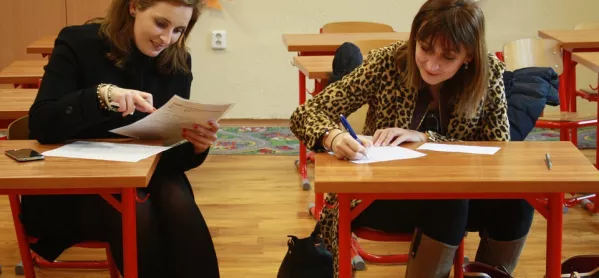- Home
- Behaviour management: ‘Instead of suspending students, why not ask their parents to join the class?’
Behaviour management: ‘Instead of suspending students, why not ask their parents to join the class?’

Permanent and temporary exclusions are on the rise across England and Wales. According to data released in December last year, between 2014 and 2015 the figure rose from 267,000 to 302,000. Of these, around 80,000 were due to “persistent disruption”.
But what if there was a radical solution to halting this rise?
In America, some schools believe they have found it. The so-called “reverse suspension” is being trialled in schools across the state of West Virginia. Apparently, it is yielding some promising results. The idea is that instead of the school excluding the child, the parent accompanies the child into school. At Huntington East Middle School, the parents of troubled students were offered this alternative. Most took the offer up and apparently, exclusions in this particular school were down by 50 per cent and behaviour incidents across school by two-thirds.
When I first read about this, it struck me that it is potentially a great idea for a number of reasons.
First, the parents would be inconvenienced in some way and this would encourage them to address the issue with their child quickly.
Second, parents would see what was happening in the class but particularly what the teachers were doing to support their child on a day-to-day basis.
Third, no 13-year-old wants their mum in school with them for the day, sitting next to them. This could be a huge deterrent and provide an additional “bridge” before permanent or temporary exclusion.
Finally, most parents are hugely supportive of teachers and giving their child the best possible chance; but many don’t understand how lessons are taught in 2016 and the support that students receive.
This kind of “visit” would allow them to witness first-hand the dedication of teachers, the resources and guidance provided and also the behaviour of children in comparison with their own. Of course, that child may be as good as gold for the two days the parent is present, but ultimately that doesn’t matter, as the result will be: “This is how the child can behave.”
I have written before about parents being made to take more responsibility within our education system to improve outcomes. At the moment, I feel the scales of accountability are firmly tipped against the school and the teachers. I think this approach has potential to engage parents where engagement is most needed; at the sharp end of their child’s education.
Of course, there are notable problems and challenges with the approach.
Obviously, some parents will have demanding full-time jobs and simply won’t be able to take an extra day or two off. It is not clear what the schools in the US do in this situation. Do they ask another relative to come in or just revert to a standard suspension rather than a “reverse” one? (The flip-side is that the inconvenience to the parent might bring a heightened sense of urgency in getting their child on the right path.)
No pupil wants their parent sitting in class
And then there’ll be the parents who refuse. Personally, I think this would be rare, because by the time this kind of action has kicked in, the student will probably be a fair way down the line towards a permanent exclusion. No parent wants that for their child, so even those completely non-supportive of school will surely feel an urge to support in this case, given the alternative.
Finally, a reverse suspension could present logistical nightmares for schools, in that DBS checks and other such administration might be required to allow the system to work.
I asked several members of the teaching community in the UK what they made of the idea.
Debra Kidd, author and trainer, wondered if there would be a “kick-back from parents” who would have to take a day off work.
But she said: “As a deterrent, it seems to make more sense than sending a child home - they’re still in school, still learning and don’t get a day to lie in, playing video games, and they don’t fall behind. In some ways, the embarrassment of having your parent with you in school is deterrent enough.”
However, she did raise the issue of parents who would not come to school: “What if their parent has alcohol or drug issues? Is it right to drag families into a limelight which could well lead to bullying and teasing for a child?”
Meanwhile, Tim Taylor, author and freelance teacher, said he preferred a more solution-focused approach: “It sounds like punishment by another name. I’m sure the students hate it, but is it really necessary?”
Perhaps the most salient critique came from Niomi Roberts, a primary school teacher and edublogger: “Lots of teachers wouldn’t feel comfortable about that parent being sat in their lesson, even if there has been some sort of agreement, because they can go away and say, ‘It’s the teacher’s fault.’”
And that’s a biggie.
Thomas Rogers is a teacher who runs rogershistory.com and tweets @RogersHistory
For more columns by Tom, view his back catalogue.
Want to keep up with the latest education news and opinion? Follow TES on Twitter and like TES on Facebook
Keep reading for just £1 per month
You've reached your limit of free articles this month. Subscribe for £1 per month for three months and get:
- Unlimited access to all Tes magazine content
- Exclusive subscriber-only stories
- Award-winning email newsletters



